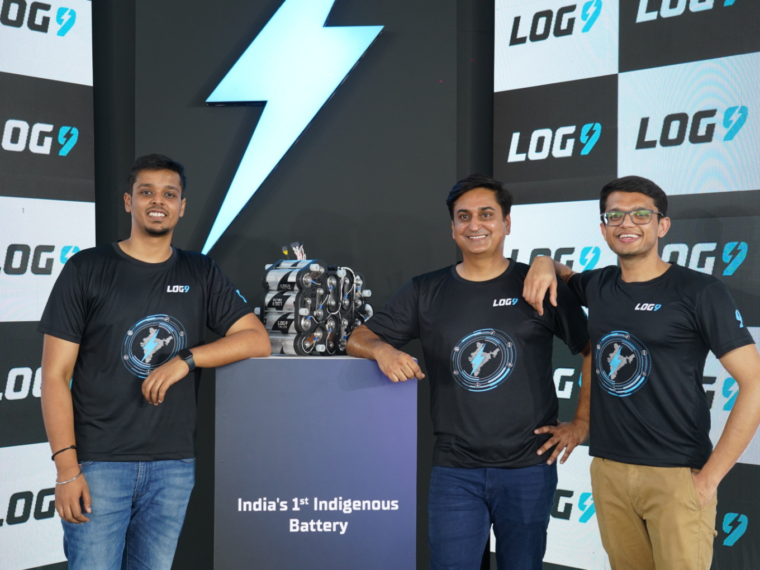
Log9 unveiled the country’s maiden commercial Li-ion cell manufacturing line in Bengaluru, which has an initial capacity of 50 MWh (megawatt-hour)
The unit will produce LTO and LFP cells and will also support the production of large-form factor cylindrical cells ranging from 22 Series to 66 Series
The development comes a few months after Log9 secured $40 Mn in Series B funding led by Amara Raja Batteries Ltd and Petronas Ventures
A year after it promised its stakeholders that it would commission a lithium-ion (Li-ion) manufacturing plant, battery startup Log9 unveiled the country’s maiden commercial Li-ion cell manufacturing line this week.
The new facility, based in Bengaluru’s Jakkur, will churn out batteries for electric vehicles (EVs) and energy storage. With an initial capacity of 50 MWh (megawatt-hour), the plant will largely cater to lithium-titanium-oxide (LTO) and lithium iron phosphate (LFP) cell manufacturing.
The line will also support manufacturing of large form factor cylindrical cells ranging from 22 Series to 66 Series.
The launch event also saw the unveiling of the startup’s in-house battery management system (BMS) called Charvik. This new system comes embedded with power control mechanisms and SoX algorithms to ensure safety and reliability for applications.
The startup also shared insights on its tech stack plan which enables fast charging of LFP batteries on public charging networks while preserving cycle life of batteries. It also gave a sneak-peek into its advanced cooling technologies, cell design and cell control mechanisms.
“It is a moment of great pride for us to commission India’s first commercial Li-ion cell manufacturing line on the 2nd edition of Day Zero. On this day, we also want to congratulate all the Log9ers who have been a part of this journey,” said Akshay Singhal, cofounder and CEO of Log9.
The event also saw the startup launching its academic engagement program called Log9 Rise which aims to support the creation of a talent pool in the battery tech ecosystem in the country.
Founded in 2015 by Singhal, Kartik Hajela and Pankaj Sharma, Log9 is a deeptech startup that manufactures batteries for EVs and energy storage. Its product portfolio includes the RapidX range of EV batteries which cater largely to two-wheeler EVs.
From being incubated at IIT-Roorkee in 2015 to building a full fledged plant in the outskirts of Bengaluru, Log9 has put its plans to scale up operations in full throttle mode. What has helped is the growing clean energy needs of the country and an equally attractive EV market which has grown multifold in the past few years.
The big-ticket $40 Mn funding round raised earlier this year, led by Amara Raja Batteries Ltd and Petronas Ventures, appears to have only strengthened its plans.
Log9 claims to have so far deployed more than 3,000 batteries in EVs and expanded its footprints to more than 20 cities in the country, including Delhi, Bengaluru and Chennai.
Its products such as Nanocaps are largely powered by state-of-the-art 3 volt ultracapacitors, built on the back of 16 patents that the startup has for graphene synthesis and graphene products. Log9 claims that its batteries offer higher energy and power density while having the lowest current leakage. On the other hand, its aluminium fuel cells run on air and water, and pack 8000 Whr/kg of energy.
Log9 largely partners with businesses across three tiers which include onboarding of charging partners and fleet solution partners. Then there is the aspect of clean mobility solutions under which it partners directly with OEMs to offer battery-related solutions.
As India marches towards its goal of EV30@30, the startup is well poised to leverage the burgeoning market. What has further helped is the government incentives and emergence of EV startups that have pushed the space and scaled up EV penetration in the country.
While the Centre has slashed GST on all types of lithium-ion batteries, the space has its own set of challenges. Lack of availability of raw materials and skilled labour in the industry is a major constraint for the growth of EV battery segment in India.
As a result, companies have to import products which adds to the costs. Then there is the major issue of environmental compliance which pose major challenges to the operation of such startups.
Despite this, the outlook for the space looks promising with the homegrown lithium-ion battery market projected to have clinched a revenue of $4.29 Bn in 2022. This number is estimated to reach $25.3 Bn by 2031 on the back of growing demand for EV batteries and higher adoption of EVs.





